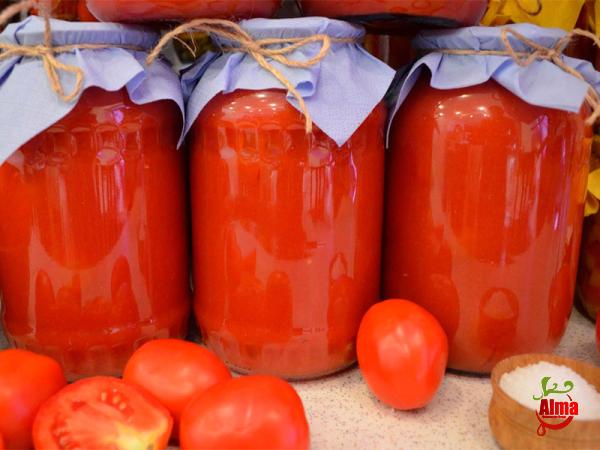The Rise and Appeal of Organic Tomato Paste Introduction: Organic food is gaining popularity worldwide due to its perceived health benefits, environmental sustainability, and ethical production practices. Amongst the vast array of organic food products, organic tomato paste holds a special place. In this article, we will explore the fascinating world of organic tomato paste, understanding its production, benefits, and the growing consumer demand for this nutritious ingredient. 1. Understanding Organic Tomato Paste: 1.1 What is Organic Tomato Paste? Organic tomato paste is a concentrated form of tomatoes obtained by removing the seeds and skin, followed by cooking and reducing the water content. It is a versatile ingredient used in various culinary preparations and is known for its rich flavor, vibrant color, and nutritional value. 1.2 Organic vs. Conventional Tomato Paste: The key difference between organic and conventional tomato paste lies in the farming practices and regulations followed during production. Organic tomato paste is made from tomatoes grown without the use of synthetic pesticides, herbicides, or genetically modified organisms (GMOs). In contrast, conventional tomato paste may contain traces of pesticides and GMOs due to the use of chemicals in farming. 2. Production Process of Organic Tomato Paste: 2.1 Organic Tomato Cultivation: Organic tomato paste production starts with cultivation. The organic farming practices employed prioritize soil health, crop rotation, and natural pest control methods. Organic farmers adhere to strict guidelines to maintain the organic certification of their tomatoes. 2.2 Harvesting and Sorting: Once the tomatoes reach the optimum ripeness, they are harvested carefully to ensure quality. Sorting is a critical step where damaged or unripe tomatoes are removed, leaving only the best quality produce for processing. 2.3 Tomato Paste Production: The tomatoes are then washed, blanched, and de-skinned to obtain the pulp. The pulp is cooked and reduced to remove excess water content, resulting in a thick paste. Some organic tomato paste producers also add salt or natural preservatives to extend the product’s shelf life. 3. Health Benefits of Organic Tomato Paste: 3.1 Nutritional Value: Organic tomato paste is a rich source of essential vitamins, minerals, and antioxidants. It contains high amounts of vitamin C, potassium, and lycopene – a potent antioxidant known to reduce the risk of certain cancers and cardiovascular diseases. 3.2 Anti-inflammatory Properties: The natural compounds present in organic tomato paste, such as lycopene, have anti-inflammatory properties. Regular consumption of lycopene-rich foods has been linked to reduced inflammation in the body, potentially lowering the risk of chronic diseases like arthritis and diabetes.

tomato paste
 3.3 Heart Health: Studies suggest that the lycopene in organic tomato paste may contribute to cardiovascular health by reducing LDL cholesterol oxidation and improving blood vessel function. Additionally, the high potassium content in tomato paste can help lower blood pressure levels. 4. Environmental and Sustainability Advantages: 4.1 Reduced Chemical Contamination: Organic tomato paste production relies on sustainable farming practices that eliminate the use of synthetic pesticides and chemical fertilizers. This helps minimize chemical contamination of soil, water sources, and ultimately, the food chain. 4.2 Promoting Biodiversity: Organic farming methods prioritize biodiversity by encouraging the growth of beneficial insects, birds, and other organisms. This creates a healthier ecosystem, safeguarding natural resources and supporting sustainable food production. 4.3 Soil Conservation: The absence of chemicals in organic cultivation helps maintain soil health, preventing degradation and erosion. Organic farming practices focus on soil enrichment through composting, crop rotation, and cover cropping, ensuring long-term soil fertility. 5. Market Demand and Consumer Perception: 5.1 Global Organic Market Growth: The global organic food market has experienced substantial growth in recent years, with an increasing number of consumers seeking healthier and more sustainable food options. The rising demand for organic tomato paste aligns with this growing trend. 5.2 Consumer Perception of Organic Tomato Paste: Consumers perceive organic tomato paste as a healthier choice due to its pesticide-free cultivation. The desire for cleaner label products, free from artificial additives, has prompted consumers to switch to organic options. Additionally, the environmentally-conscious consumer seeks to support sustainable agriculture practices. 6. Culinary Applications and Recipe Ideas: 6.1 Versatility in Cooking: Organic tomato paste is a versatile ingredient that adds depth and flavor to a wide range of dishes, including soups, stews, sauces, and marinades. Its concentrated flavor allows for a more intense tomato taste, enhancing the overall culinary experience.
3.3 Heart Health: Studies suggest that the lycopene in organic tomato paste may contribute to cardiovascular health by reducing LDL cholesterol oxidation and improving blood vessel function. Additionally, the high potassium content in tomato paste can help lower blood pressure levels. 4. Environmental and Sustainability Advantages: 4.1 Reduced Chemical Contamination: Organic tomato paste production relies on sustainable farming practices that eliminate the use of synthetic pesticides and chemical fertilizers. This helps minimize chemical contamination of soil, water sources, and ultimately, the food chain. 4.2 Promoting Biodiversity: Organic farming methods prioritize biodiversity by encouraging the growth of beneficial insects, birds, and other organisms. This creates a healthier ecosystem, safeguarding natural resources and supporting sustainable food production. 4.3 Soil Conservation: The absence of chemicals in organic cultivation helps maintain soil health, preventing degradation and erosion. Organic farming practices focus on soil enrichment through composting, crop rotation, and cover cropping, ensuring long-term soil fertility. 5. Market Demand and Consumer Perception: 5.1 Global Organic Market Growth: The global organic food market has experienced substantial growth in recent years, with an increasing number of consumers seeking healthier and more sustainable food options. The rising demand for organic tomato paste aligns with this growing trend. 5.2 Consumer Perception of Organic Tomato Paste: Consumers perceive organic tomato paste as a healthier choice due to its pesticide-free cultivation. The desire for cleaner label products, free from artificial additives, has prompted consumers to switch to organic options. Additionally, the environmentally-conscious consumer seeks to support sustainable agriculture practices. 6. Culinary Applications and Recipe Ideas: 6.1 Versatility in Cooking: Organic tomato paste is a versatile ingredient that adds depth and flavor to a wide range of dishes, including soups, stews, sauces, and marinades. Its concentrated flavor allows for a more intense tomato taste, enhancing the overall culinary experience.
Specifications of tomato paste
 6.2 Recipe Ideas: Some popular recipes utilizing organic tomato paste include classic tomato sauce, homemade ketchup, chili con carne, and braised meat dishes. The possibilities are endless, and with organic tomato paste, the taste is elevated to a whole new level. Conclusion: In the era of conscious food choices, organic tomato paste has emerged as a favorite ingredient due to its nutritional value, sustainable production methods, and clean label appeal. From its production process to its health benefits and market demand, the rise of organic tomato paste signifies a paradigm shift towards a more sustainable and health-conscious food culture. As consumers continue to prioritize their well-being and environmental impact, organic tomato paste is likely to maintain its popularity, integrating itself into kitchens worldwide and contributing to a more sustainable food future.I. The Growing Market for Organic Tomato Paste The market for organic tomato paste has been witnessing significant growth in recent years, driven by the increasing consumer preference for organic and natural food products. The global organic food market is expanding at a rapid pace, with consumers becoming more health-conscious and environmentally aware. As part of this trend, organic tomato paste stands out as a sought-after product that offers both health benefits and sustainable production methods. Organic tomato paste is gaining popularity not only among health-conscious individuals but also among those who prioritize ethical and sustainable farming practices. The demand for organic food products, including tomato paste, has been fueled by concerns about pesticide use, genetic modification, and environmental impact associated with conventional food production. Consumers are increasingly turning to organic alternatives, considering them a safer and healthier choice for themselves and the planet. II. Health Benefits and Nutritional Value Organic tomato paste not only adds flavor and richness to meals but also brings a host of health benefits to the table. It is a powerhouse of essential vitamins, minerals, and antioxidants. The high concentration of vitamin C in organic tomato paste helps boost the immune system and supports collagen production. Potassium, another essential nutrient found in abundance, promotes heart health and maintains proper fluid balance in the body. One of the key health benefits of organic tomato paste lies in its lycopene content. Lycopene, a carotenoid pigment responsible for the vibrant red color of tomatoes, has been linked to a reduced risk of various types of cancer, including prostate, lung, and stomach cancers. It also exhibits antioxidant properties, protecting the body against harmful free radicals that contribute to cell damage and aging. Moreover, organic tomato paste contains dietary fiber, which aids digestion and supports a healthy gut. The presence of natural sugars and low fat content makes it a suitable choice for individuals following a balanced diet or seeking to manage their weight. With its combination of vitamins, minerals, and antioxidants, organic tomato paste can be a valuable addition to a well-rounded and nutritious diet. III. Production and Sourcing of Organic Tomato Paste Producing high-quality organic tomato paste starts at the source, with farmers employing organic farming practices to cultivate the tomatoes. Organic tomato crops are grown without the use of synthetic pesticides, herbicides, or genetically modified organisms (GMOs). Instead, organic farmers utilize techniques like crop rotation, natural pest control methods, and the application of organic fertilizers to ensure the health and productivity of the plants. To maintain their organic certification, farmers must adhere to strict guidelines throughout the cultivation process. This includes using organic seeds, avoiding the use of chemical sprays, and implementing comprehensive measures to protect the soil, biodiversity, and surrounding environment. The careful selection and sorting of tomatoes for processing ensure that only the best quality produce is utilized, resulting in a superior organic tomato paste.
6.2 Recipe Ideas: Some popular recipes utilizing organic tomato paste include classic tomato sauce, homemade ketchup, chili con carne, and braised meat dishes. The possibilities are endless, and with organic tomato paste, the taste is elevated to a whole new level. Conclusion: In the era of conscious food choices, organic tomato paste has emerged as a favorite ingredient due to its nutritional value, sustainable production methods, and clean label appeal. From its production process to its health benefits and market demand, the rise of organic tomato paste signifies a paradigm shift towards a more sustainable and health-conscious food culture. As consumers continue to prioritize their well-being and environmental impact, organic tomato paste is likely to maintain its popularity, integrating itself into kitchens worldwide and contributing to a more sustainable food future.I. The Growing Market for Organic Tomato Paste The market for organic tomato paste has been witnessing significant growth in recent years, driven by the increasing consumer preference for organic and natural food products. The global organic food market is expanding at a rapid pace, with consumers becoming more health-conscious and environmentally aware. As part of this trend, organic tomato paste stands out as a sought-after product that offers both health benefits and sustainable production methods. Organic tomato paste is gaining popularity not only among health-conscious individuals but also among those who prioritize ethical and sustainable farming practices. The demand for organic food products, including tomato paste, has been fueled by concerns about pesticide use, genetic modification, and environmental impact associated with conventional food production. Consumers are increasingly turning to organic alternatives, considering them a safer and healthier choice for themselves and the planet. II. Health Benefits and Nutritional Value Organic tomato paste not only adds flavor and richness to meals but also brings a host of health benefits to the table. It is a powerhouse of essential vitamins, minerals, and antioxidants. The high concentration of vitamin C in organic tomato paste helps boost the immune system and supports collagen production. Potassium, another essential nutrient found in abundance, promotes heart health and maintains proper fluid balance in the body. One of the key health benefits of organic tomato paste lies in its lycopene content. Lycopene, a carotenoid pigment responsible for the vibrant red color of tomatoes, has been linked to a reduced risk of various types of cancer, including prostate, lung, and stomach cancers. It also exhibits antioxidant properties, protecting the body against harmful free radicals that contribute to cell damage and aging. Moreover, organic tomato paste contains dietary fiber, which aids digestion and supports a healthy gut. The presence of natural sugars and low fat content makes it a suitable choice for individuals following a balanced diet or seeking to manage their weight. With its combination of vitamins, minerals, and antioxidants, organic tomato paste can be a valuable addition to a well-rounded and nutritious diet. III. Production and Sourcing of Organic Tomato Paste Producing high-quality organic tomato paste starts at the source, with farmers employing organic farming practices to cultivate the tomatoes. Organic tomato crops are grown without the use of synthetic pesticides, herbicides, or genetically modified organisms (GMOs). Instead, organic farmers utilize techniques like crop rotation, natural pest control methods, and the application of organic fertilizers to ensure the health and productivity of the plants. To maintain their organic certification, farmers must adhere to strict guidelines throughout the cultivation process. This includes using organic seeds, avoiding the use of chemical sprays, and implementing comprehensive measures to protect the soil, biodiversity, and surrounding environment. The careful selection and sorting of tomatoes for processing ensure that only the best quality produce is utilized, resulting in a superior organic tomato paste.
buy tomato paste
 IV. Environmental Sustainability and Organic Tomato Paste The production of organic tomato paste aligns with the principles of environmental sustainability. By eliminating the use of synthetic pesticides and fertilizers, organic farming practices reduce chemical contamination of soil, water sources, and ecosystems. Farmers prioritize soil conservation through methods like composting, crop rotation, and cover cropping, which help maintain soil fertility and prevent erosion. Another sustainable aspect of organic tomato paste production is the promotion of biodiversity. Organic farms work towards creating a balanced ecosystem by encouraging the presence of beneficial insects, birds, and other organisms. This helps control pests naturally, reducing the reliance on chemical interventions. By supporting organic tomato paste, consumers contribute to the preservation of natural resources and the protection of wildlife habitats. V. Innovative Packaging and Product Differentiation As the demand for organic tomato paste continues to grow, manufacturers are exploring innovative packaging solutions and product differentiations to meet consumer preferences. Many organic tomato paste brands have switched to sustainable packaging materials, such as recyclable glass jars or pouches made from compostable materials, reflecting the eco-conscious mindset of their target audience. Moreover, some companies are introducing flavored and seasoned varieties of organic tomato paste, offering consumers convenience and versatility in their cooking. These options can include additions like herbs, garlic, or chili, providing unique flavors and eliminating the need for additional seasonings. Such product innovations cater to the evolving tastes and preferences of consumers, creating a point of differentiation in a competitive market. VI. Marketing and Consumer Education Effective marketing plays a crucial role in the success of organic tomato paste, as it helps educate consumers about its benefits and encourages them to make informed choices. Companies are investing in marketing campaigns that highlight the organic and sustainable aspects of their products while emphasizing the delicious flavor and convenience of organic tomato paste in culinary preparations. Consumer education is an integral part of marketing organic tomato paste. Brands are engaging with consumers through various channels, such as social media, recipe websites, and cooking demonstrations, to showcase the versatility and health benefits of organic tomato paste. Providing cooking tips, recipe ideas, and nutritional information helps consumers make the most of this unique ingredient and drives demand. VII. Challenges and Opportunities for Organic Tomato Paste While the market for organic tomato paste is expanding, there are also challenges associated with its production and consumption. One challenge lies in ensuring a consistent supply of organic tomatoes, as weather conditions, pests, and diseases can impact crop yields. Additionally, organic farming practices may require higher labor and production costs, affecting the final price of organic tomato paste. However, these challenges also present opportunities for growth and innovation. Investments in organic agriculture research, development of improved farming techniques, and collaboration between farmers and manufacturers can address supply chain concerns and drive efficiency. Providing affordable organic options and increasing accessibility can help expand the consumer base for organic tomato paste. VIII. Future Prospects and Conclusion The future of organic tomato paste looks promising, as the organic food market continues to grow globally. Consumer awareness and demand for organic products are expected to increase, driven by concerns about health, sustainability, and ethical practices. With its numerous health benefits, nutritional value, and eco-friendly production methods, organic tomato paste is well-positioned to capitalize on these emerging trends. As more consumers prioritize their health and the planet, organic tomato paste will likely become a staple ingredient in households worldwide. The use of sustainable farming practices, innovative packaging, and effective marketing strategies will further boost its appeal. By choosing organic tomato paste, consumers contribute to their own well-being while supporting responsible agricultural practices and a sustainable food future for generations to come.
IV. Environmental Sustainability and Organic Tomato Paste The production of organic tomato paste aligns with the principles of environmental sustainability. By eliminating the use of synthetic pesticides and fertilizers, organic farming practices reduce chemical contamination of soil, water sources, and ecosystems. Farmers prioritize soil conservation through methods like composting, crop rotation, and cover cropping, which help maintain soil fertility and prevent erosion. Another sustainable aspect of organic tomato paste production is the promotion of biodiversity. Organic farms work towards creating a balanced ecosystem by encouraging the presence of beneficial insects, birds, and other organisms. This helps control pests naturally, reducing the reliance on chemical interventions. By supporting organic tomato paste, consumers contribute to the preservation of natural resources and the protection of wildlife habitats. V. Innovative Packaging and Product Differentiation As the demand for organic tomato paste continues to grow, manufacturers are exploring innovative packaging solutions and product differentiations to meet consumer preferences. Many organic tomato paste brands have switched to sustainable packaging materials, such as recyclable glass jars or pouches made from compostable materials, reflecting the eco-conscious mindset of their target audience. Moreover, some companies are introducing flavored and seasoned varieties of organic tomato paste, offering consumers convenience and versatility in their cooking. These options can include additions like herbs, garlic, or chili, providing unique flavors and eliminating the need for additional seasonings. Such product innovations cater to the evolving tastes and preferences of consumers, creating a point of differentiation in a competitive market. VI. Marketing and Consumer Education Effective marketing plays a crucial role in the success of organic tomato paste, as it helps educate consumers about its benefits and encourages them to make informed choices. Companies are investing in marketing campaigns that highlight the organic and sustainable aspects of their products while emphasizing the delicious flavor and convenience of organic tomato paste in culinary preparations. Consumer education is an integral part of marketing organic tomato paste. Brands are engaging with consumers through various channels, such as social media, recipe websites, and cooking demonstrations, to showcase the versatility and health benefits of organic tomato paste. Providing cooking tips, recipe ideas, and nutritional information helps consumers make the most of this unique ingredient and drives demand. VII. Challenges and Opportunities for Organic Tomato Paste While the market for organic tomato paste is expanding, there are also challenges associated with its production and consumption. One challenge lies in ensuring a consistent supply of organic tomatoes, as weather conditions, pests, and diseases can impact crop yields. Additionally, organic farming practices may require higher labor and production costs, affecting the final price of organic tomato paste. However, these challenges also present opportunities for growth and innovation. Investments in organic agriculture research, development of improved farming techniques, and collaboration between farmers and manufacturers can address supply chain concerns and drive efficiency. Providing affordable organic options and increasing accessibility can help expand the consumer base for organic tomato paste. VIII. Future Prospects and Conclusion The future of organic tomato paste looks promising, as the organic food market continues to grow globally. Consumer awareness and demand for organic products are expected to increase, driven by concerns about health, sustainability, and ethical practices. With its numerous health benefits, nutritional value, and eco-friendly production methods, organic tomato paste is well-positioned to capitalize on these emerging trends. As more consumers prioritize their health and the planet, organic tomato paste will likely become a staple ingredient in households worldwide. The use of sustainable farming practices, innovative packaging, and effective marketing strategies will further boost its appeal. By choosing organic tomato paste, consumers contribute to their own well-being while supporting responsible agricultural practices and a sustainable food future for generations to come.









Your comment submitted.